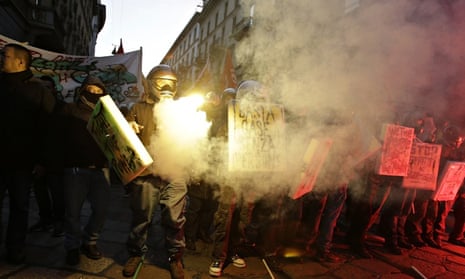Violent clashes broke out between protesters and police in Milan on Sunday, as the La Scala opera season opened with a performance shaped by this year’s events in Ukraine and the Middle East.
Two people were injured as demonstrators tried to march towards the theatre, only to be pushed back by riot police. More than 1,000 officers had been brought in due to “greater concerns” than usual over security, La Scala spokesman Paolo Besana said.
Protesters seize on the opening night each year to draw attention to their various causes, which are often far removed from the opera world. This year campaigners for housing rights took centre stage, following recent evictions of occupied buildings in the city.
“Fuck austerity” and “Jobs Act = Bad Jobs” signs spoke of broader dissatisfaction in the crisis-weary country, as some protesters hurled smoke bombs at police.
Inside the theatre an illustrious audience took their seats, including IMF chief, Christine Lagarde, and fashion designer, Giorgio Armani. The Italian president, Giorgio Napolitano, and the prime minister, Matteo Renzi, were absent from the gala performance, although the country’s culture minister, Dario Franceschini, was one of a number of politicians in the audience.
Daniel Barenboim marked the season premiere – his last as musical director of La Scala – with a performance of Fidelio, Ludwig van Beethoven’s only opera, winning a 13-minute ovation.
The audience threw flowers on to the stage at the end of the modern-dress production, which was the first season opening for the new artistic director, Alexander Pereira, who replaces Stephane Lissner.
Deborah Warner, the British director behind tonight’s Fidelio production, had spoken of “an extraordinary atmosphere” in Milan ahead of the opening night. “It’s an immensely important day for La Scala,” she said.
The reworking of Beethoven’s heroic tale, which portrays a political prisoner being rescued by his wife, takes on a modern twist in Milan with a nod to current conflicts.
“The events of this year were impacting fast and furiously as we were working on it; Ukraine and then the Isis beheadings.
“I’m particularly aware of this, so the audience will be,” said Warner, who framed her 2001 Glyndebourne production of Fidelio on the Kosovo war.
She remained unconcerned about the notorious loggionisti; a band of opera fans known for booing at the theatre’s top talent.
“I’m delighted that they are passionate about the form. The point about Fidelio is that it’s about bravery. There isn’t a member of my cast shaking in their boots or worrying about anything but doing their work justice,” Warner said of the rowdy traditionalists.
Of greater concern was the negative impact such a high-profile event could have in a country still suffering from the economic downturn. “The danger of gala night is that people will see on TV that the opera is full of people wearing evening dress,” said Warner.

Comments (…)
Sign in or create your Guardian account to join the discussion